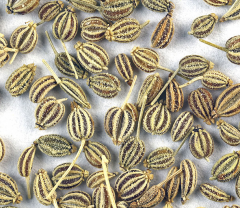Ajowan (Ajwan)
| Infobox on Ajowan (Ajwan) | |
|---|---|
| Example of Ajowan (Ajwan) |  |
| Facts | |
| Origin | Middle East, Asia |
| Stowage factor (in m3/t) | - |
| Humidity / moisture | 7,4% |
| Ventilation | As applicable for seeds |
| Risk factors | - |
Ajowan (Ajwan)
Description
Trachyspermum ammi, commonly known as ajowan, Bishop's Weed, ajowan caraway, carom seeds, or thymol seeds, is a plant of India, Pakistan and the Near East whose seeds are used as a spice.
The plant has a similarity to parsley. Because of their seed-like appearance, the fruit pods are sometimes called seeds; they are egg-shaped and grayish in colour.
The 'seed' (i.e., the fruit pod) is often confused with lovage seed; even some dictionaries mistakenly state that comes from the lovage plant.
The raw fruit pod of Trachyspermum ammi smells almost exactly like thyme because it also contains thymol, but is more aromatic and less subtle in taste, as well as slightly bitter and pungent. Even a small amount of raw fruit pods of Trachyspermum ammi tend to dominate the flavour of a dish.
Trachyspermum ammi originated in the Middle East, possibly in Egypt, and the Indian subcontinent, but also in Iran and Afghanistan. It is sometimes used as an ingredient in berbere, a spice mixture favored in Eritrea and Ethiopia.
In India, the major producers are the states Rajasthan and Gujarat, with Rajasthan producing about 90% of India's total output.
Applications
The seeds are used in breads, biscuits, savory pastries, and in bean dishes. This spice closely resembles the lovage seed (celery seed).
Trachyspermum ammi is traditionally believed to be a digestive aid. In southern parts of India, dry Trachyspermum ammi seeds are powdered and soaked in milk, which is then filtered and fed to babies.
The seed, and specially the essential oil in the seed, is strongly antiseptic, antispasmodic, aromatic, bitter, diaphoretic, digestive, diuretic, expectorant and tonic. Generally, the seed and its Essential Oils are used for the treatment of colds, cough, influenza, asthma, diarrhea, cholera, colic, indigestion, wind, edema, arthritis and rheumatism. Due to its food and medicinal applications, ajwain can be considered as an important and high value crop.
Shipment/storage
An aromatic seed from India usually shipped in bags. Provides ajowan oil and thymol used in cooking and pharmacy. Heats readily. Will give taint and should be stowed away from edible goods.
Risk factors
- Moisture damage
- Heats readily
- Will give taint and should be stowed away from edible goods.
- Loss in weight may be due to loss of moisture content, heating, infestation or seepage











